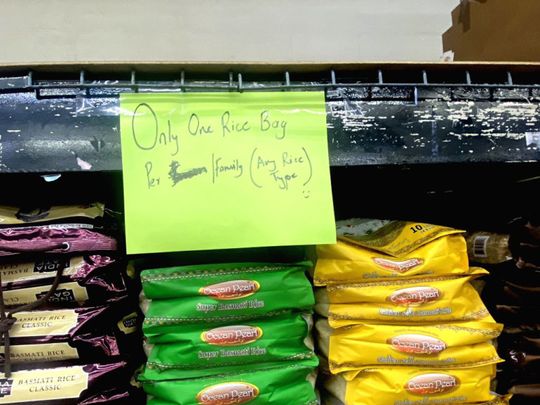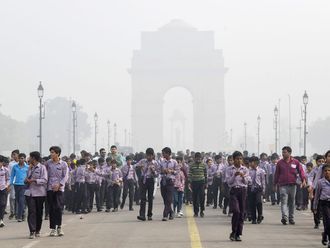
New Delhi: India’s move to ban certain rice exports has sparked some panic buying in various countries, with videos on social media showing bags of the staple food flying off the shelves and long lines outside grocery stores.
From the US to Canada and Australia, reports of overseas Indians stocking up are going viral. Some shops have imposed buying limits, while others hiked prices to cash in on the frenzy. Indian restaurants worry about a shortage.
Many departmental stores in the US are limiting the number of rice bags customers can purchase to one bag.
A user on Twitter (now X) has shared a picture in which a notice put up by a store in the US, says, “Only one rice bag per family”.
“At the Indian store today for spices, I checked to see if rice prices went up due to the export ban. I was shocked to see this. Limits on quantities. Stock up on your staples NOW. Other countries are looking at the ban on rice and are stock piling,” it tweeted.
Several NRIs (non-resident Indians) also shared images of empty store shelves, possibly as a result of panic buying fuelled by fears and misinformation about India’s complete ban on rice exports.
“Impact of rice exports ban by India government in USA. No rice bag left .. pretty much same situation in all stores here .. #RiceBan #riceexportban #rice #Jansuraaj,” a user tweeted with attached images of empty shelves.
“Don’t know if these empty shelves at Walmart today where Basmati rice is usually stocked, is related to the news of India’s ban on rice exports but it wouldn’t surprise me either,” another user said.
There are also concerns about hoarding rice and selling it for a much higher price on online forums.
“So all the desi stores are out of Indian rice. Every NRI family has bought 10-15 bags of rice because India has blocked the export of “non-basmati” rice. Therefore high IQ NRIs have hoarded 100-200 kg of basmati rice per family. And few are now selling it on Facebook marketplace,” a user commented.
Rice is vital to the diets of billions in Asia and Africa. India’s restrictions, which apply to shipments of non-basmati white rice, are aimed at controlling local prices, but they add to strains on global food markets that have already been roiled by bad weather and the worsening conflict in Ukraine.
“Over the past few days, people have started buying maybe twice as much rice as usual. So we had to restrict,” said Shishir Shaima, a manager of MGM Spices, an Indian grocery store in Surry Hills in Australia.
Buying frenzy
The store is now allowing customers to buy only one 5-kilogram bag of rice each. “Some people get mad when we won’t let them buy more than one bag, but we won’t let them,” Shaima said.
In the US, videos show people caught up in a buying frenzy. Bloomberg could not independently verify their authenticity. Some South Asian grocery stores in Toronto have also implemented buying restrictions and increased retail prices, according to CityNews.
Govindasamy Jayabalan, President of the Malaysian Indian Restaurant Owners Association, said he’s concerned this will lead to a shortage of rice and increase the cost of making dishes such as thosai and rice vermicelli.
“We are very worried about this. Most of our restaurant customers are from the lower income groups,” he said. “It’s not that we want to increase food prices but this is putting us in a difficult situation.”
Last week, the Centre prohibited the export of non-Basmati white rice with immediate effect, in order to ensure its adequate availability in domestic markets and prevent its prices from rising.
However, there is no change in the export policy of non-Basmati rice (parboiled rice) and Basmati rice, which forms the bulk of rice exports.












